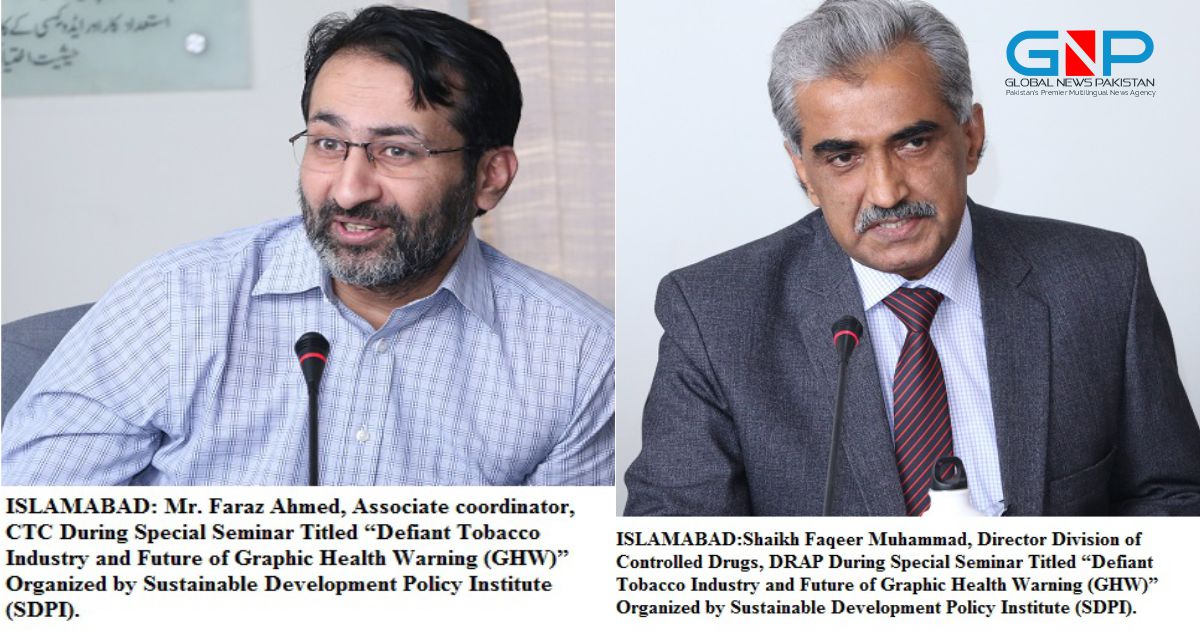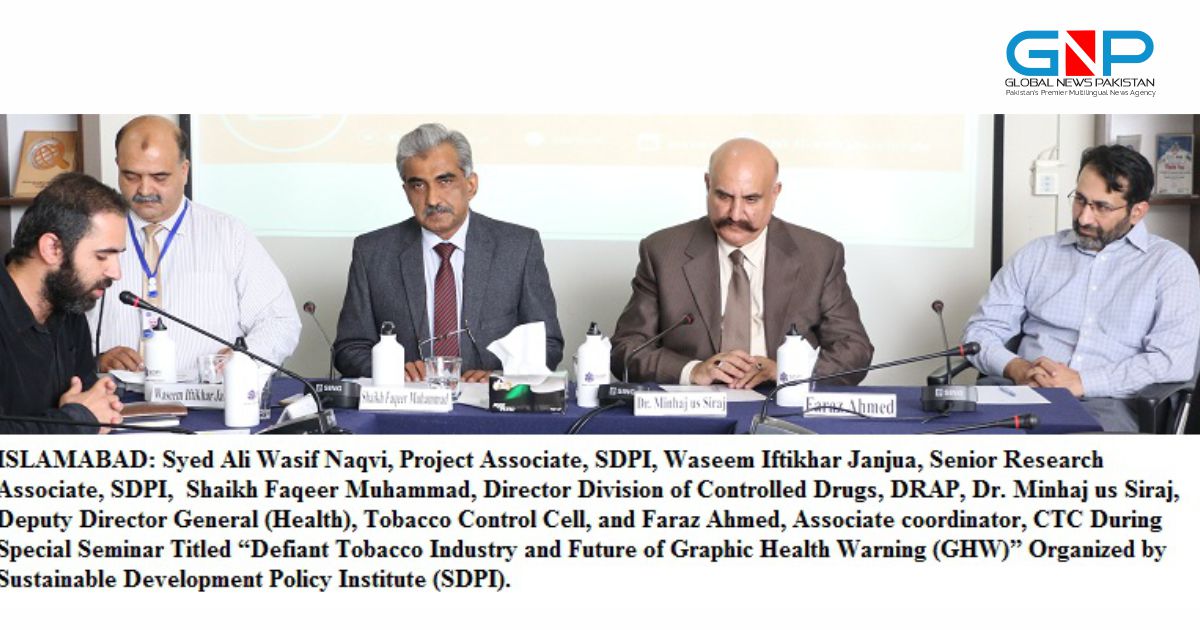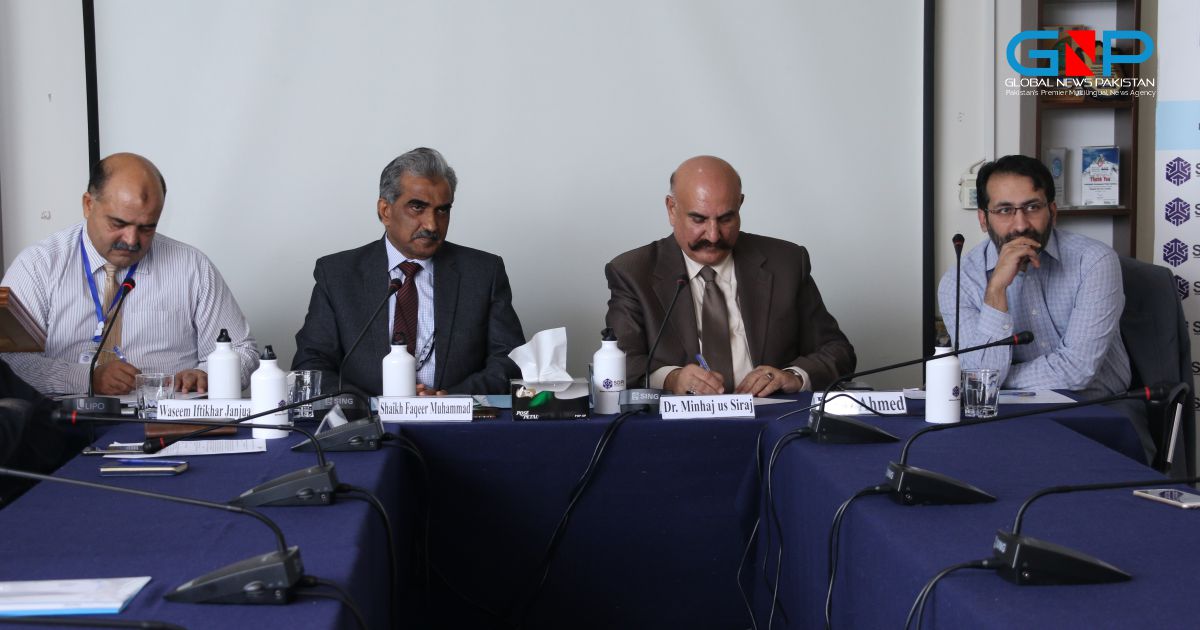Islamabad – Monday, October 07, 2019: (GNP) Tobacco control and health advocates on Monday urged the government to develop legal framework and implement standardised plain packaging as effective tobacco control measure to reduce the attractiveness and appeal of tobacco products to consumers, and effectiveness of health warnings.
Speakers at a seminar titled “Defiant Tobacco Industry and Future of Graphic Health Warning (GHW)” organized by the Sustainable Development Policy Institute (SDPI), also demanded the government to strengthen and implement its existing laws related to tobacco control and graphic health warnings (GHW).
Dr. Minhaj us Siraj, Deputy Director General (Health), Tobacco Control Cell, Ministry of National Health Services, Regulations and Coordination said the tobacco industry only interested in maximising their profit while playing with the lives of our young generation. He said the industry is so powerful that they influence our policies significantly. Even they are successful in delaying cases in courts at domestic and international level, he added. “The case of Graphic Health Warning (GHW) in Islamabad High Court (IHC), which is pending for last almost 5 years, is classic example of tobacco industry’s delaying tactics”, he lamented adding all segment of the society will have to fight together to help save the lives of our future generation from this menace and should strive for tobacco free generation.
Waseem Iftikhar Janjua, Senior Research Associate, SDPI said despite, every year in Pakistan, 160,100 people are killed due to use of tobacco products, over 24 million users continue to use tobacco products, smoking over 85 billion sticks every year. “To reduce and control of use of tobacco products, standardised plain packaging is an effective demand reduction measure that can reduce the attractiveness of tobacco products, limits misleading packaging and labeling, and increases the effectiveness of health warnings” he said adding plain packaging strips cigarette packs of all branding elements, including colours and logos, restricts use of tobacco advertising and promotion, and only allows the health warning to be printed, along with the legally mandated toxic constituents. Waseem said the world has move towards plain packaging, whereas in Pakistan, plain packaging is not yet on our cards, which should be consider as way forward.
Faraz Ahmed, Associate coordinator, Coalition for Tobacco Control-Pakistan (CTC-Pak) said there around 1.3 million people employed in the tobacco industry and we need to seriously think about a viable alternatives for those who are associated with this industry for their livelihoods. He said plain packaging is a wonderful idea to keep away our young generation from smoking of tobacco products.
Shaikh Faqeer Muhammad, Director Division of Controlled Drugs, Drug Regulatory Authority of Pakistan (DRAP) said since tobacco does not come under the ambit of drugs, therefore DRAP has no direct role in regulating the tobacco products. However, on treatment side, DRAP can only register and regulate those drugs which are meant to use as treatment of tobacco related diseases. He said raising awareness among our youth about the dire consequences of smoking tobacco products is direly needed to prevent them from dreadful diseases such as cancer. Speaking on the occasion, Mazhar Sheikh, Director Admin, National Institute of Health (NIH) also extended his organization full support in all efforts to control tobacco usage. He stressed the need for strong advocacy by partnering with media and civil society for raising awareness and putting pressure on the government for effective legislation and implementation.
Syed Ali Wasif Naqvi, Project Associate, SDPI while moderating the seminar said that though Pakistan is a signatory to Framework Convention on Tobacco Control (FCTC) since 2004 and the government has issued multiple Statutory Regulatory Orders (SROs) and made laws targeting the smoking spaces, ban on advertisement and Graphic Health Warnings (GHW), but the major problems in lack of implementation. Promulgation of robust tobacco control laws, excessive tobacco industry influence resulting into massive tax evasion, lack of Tobacco Control knowledge and capacity among the legislators are among other major challenges, he added. (GNP)




